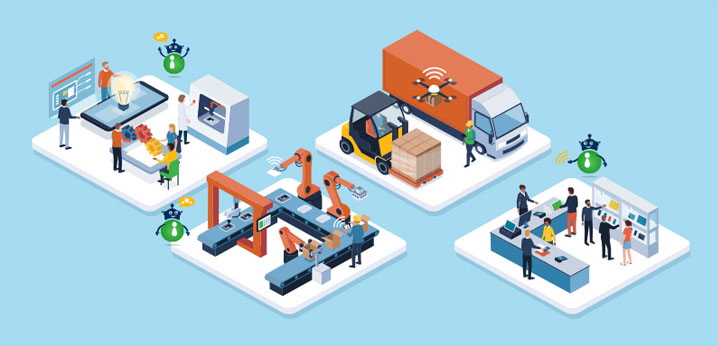
Retailers Lagging Behind Other Industries for Intelligent Automation Adoption
SHARE THIS:
Recession, inflation, battle for talent, and rising labor costs will require fast catch up
Retailers are facing substantial headwinds. The anticipated recession will slow and change shopper spending while inflation puts severe pressure on gross margins. Inventory balances remain too high on some items and too low on others due to the supply chain crisis. These challenges come as retailers continue to struggle to find talent given the extremely low unemployment rate. When they can hire, rising wages are putting further pressure on profitability.
In this unprecedented environment, retailers must find new ways to reduce expenses and improve productivity, all while offering current and potential employees more interesting jobs devoid of repetitive, mundane, and manual tasks that can otherwise be done through intelligent automation.
Intelligent automation is an array of emerging software technologies designed to help employees work more effectively and efficiently on the things that really matter. The most prominent of these technologies is called Robotic Process Automation or “RPA”, which enables companies to build, deploy, and manage software robots or “bots” that mimic what humans would otherwise need to do. Think of these bots as digital workers that support your staff.
These RPA bots can automate so many tedious things that otherwise would need to be done, and in fact are being done, by live human beings. Part of the attractiveness of RPA, is that non-technical businesspeople, not just IT, can be enlisted to create bots quickly and easily because they are often generated through “no-code” environments. This democratizes access to automation without creating a dependency on the IT department. Wouldn’t all retailer executives rather have their employees focused on more valuable activities that harness human judgment, decision making and oversight?
Another advanced automation capability is called Intelligent Document Processing (“IDP”), which enables business processes that are dependent on documents such as Excel, Word, PDFs, etc., to tightly integrate and automate document handling. This includes using intelligent capabilities like OCR for identifying document types; loading them; classifying, extracting, or redacting their content; and then validating and publishing content to enterprise software systems. There are so many retail processes that have grown dependent, particularly on Excel. Retailers must rein in and incorporate these documents more tightly into enterprise processes.
The combination of RPA and IDP working together has game-changing potential to increase organizational productivity by 25% to 50%. These gains can occur across the entire retail organization including merchandising, pricing, purchasing, shopper marketing, store operations, finance, and supply chain. The technology can enrich shopper engagement in areas like loyalty and ecommerce, and support trading partners seeking to collaborate with buyers or category managers.
Retailers focused on mergers and acquisitions are prime candidates for automation as they seek to bridge different processes, systems, and controls. Post-merger, integrating fragmented systems together quickly can be a huge advantage for realization of the anticipated M&A synergies.
One of the significant advantages of intelligent automation is that it will work with existing enterprise software, whether legacy or modern, cloud or on-premises, across varying technologies. Automation can serve as the glue that binds together disparate tasks, activities and processes, data sources, and organizational boundaries. It can be deployed quickly without significant integration activities. And it doesn’t require a big effort on the part of the information technology organization.
Sound too good to be true?
If all of this is so easy, why aren’t more retailers embracing this technology?
- Most of the emerging automation vendors in this space tend to focus on basic back-office capabilities rather than those things that move the needle for a retail enterprise.
- The various challenges mentioned at the start of this article emerged rather quickly. No one anticipated inflation getting out of control, or the post-covid supply chain issues. This has exacerbated the need for new productivity and cost saving innovations.
- There often isn’t clear ownership for digital transformation within a retail enterprise. Strategically, the executive leadership team within the retailer needs to broadly sponsor automation initiatives, and then they are typically orchestrated by either the CTO or CFO. Leadership must make automation a funded and resourced priority for the enterprise.
Gartner recently forecasted that the worldwide Hyperautomation-Enabling Software Market would reach nearly $600 Billion in 2022. “Hyperautomation has shifted from an option to a condition of survival,” said Fabrizio Biscotti, research vice president at Gartner.
Retailers can be major beneficiaries of this technology. Compared to other technology initiatives, low cost, fast deployment, and citizen enablement make it low hanging fruit. This is especially true if automation makes its way into core functions like merchandising, marketing, supply chain, etc. It would be a mistake to entrap intelligent automation solely in back-office functions like accounting or human resources.
Are you a retailer wanting to learn more about Intelligent Automation?
HuLoop Automation works with retailers to drive transformation through automation. Through a combination of our software and retail industry expertise, we can help retailers:
- Eliminate non-value adding tasks and activities from existing business and technology processes
- Automate mundane, repetitive tasks with software robots or “bots”
- Integrate critical document intelligence seamlessly into business workstreams
- Help clients progress through their automation maturity journey
- Validate process compliance, especially around regulated or SOX activities
- Measure business value and ROI
Don’t leave money or productivity gains on the table. Learn more about how Intelligent Automation can benefit your retail business! To request a meeting, consultation, or demonstration, click this link: https://huloop.ai/request-information/
About the author: Todd P. Michaud
 As Founder and Chief Executive Officer, Todd P. Michaud leads HuLoop’s strategy and oversees its execution. He is an accomplished, results-oriented, and high-energy technology executive with a sustained track record for driving breakout growth and building enduring, software businesses. Whether launching successful startups, scaling growth phase companies, or turning-around mature software businesses, Michaud succeeds by building and leading high-performing, multi-cultural, and global teams. Before HuLoop, Michaud has held executive roles at DemandTec, Hypersonix, Symphony Retail, Amdocs, NCR Corporation, Retalix, Revionics, IDS LLC, and IBM Corporation.
As Founder and Chief Executive Officer, Todd P. Michaud leads HuLoop’s strategy and oversees its execution. He is an accomplished, results-oriented, and high-energy technology executive with a sustained track record for driving breakout growth and building enduring, software businesses. Whether launching successful startups, scaling growth phase companies, or turning-around mature software businesses, Michaud succeeds by building and leading high-performing, multi-cultural, and global teams. Before HuLoop, Michaud has held executive roles at DemandTec, Hypersonix, Symphony Retail, Amdocs, NCR Corporation, Retalix, Revionics, IDS LLC, and IBM Corporation.